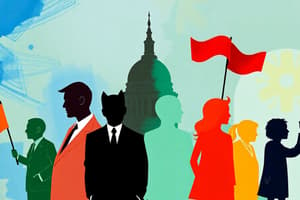Podcast
Questions and Answers
In a representative democracy, who is responsible for making decisions?
In a representative democracy, who is responsible for making decisions?
- The citizens
- The government officials
- The elected representatives (correct)
- The monarch
What is the role of the citizens in a representative democracy?
What is the role of the citizens in a representative democracy?
- Make all decisions directly
- Elect representatives to make decisions (correct)
- Advise the government officials
- Choose the monarch
Who holds the decision-making power in a representative democracy?
Who holds the decision-making power in a representative democracy?
- The military
- The judiciary
- The elected representatives (correct)
- The religious leaders
In a direct democracy, how are laws made?
In a direct democracy, how are laws made?
What type of government lacks citizen participation and freedom?
What type of government lacks citizen participation and freedom?
Which form of government allows citizens to have a say in the government through regular elections and representation?
Which form of government allows citizens to have a say in the government through regular elections and representation?
What is the characteristic of an absolute monarchy?
What is the characteristic of an absolute monarchy?
How does a dictatorship differ from a representative democracy?
How does a dictatorship differ from a representative democracy?
Flashcards are hidden until you start studying
Study Notes
Decision-Making in Democratic Systems
- In a representative democracy, elected officials make decisions on behalf of the citizens.
- Citizens play a crucial role by voting for representatives who align with their views and interests.
Power Dynamics
- Decision-making power in a representative democracy lies with elected representatives, who are accountable to the electorate.
- In a direct democracy, laws are made directly by the citizens through voting mechanisms for each law or policy.
Government Types
- Authoritarian governments lack citizen participation and freedom, restricting individual rights and liberties.
- Representative democracies provide citizens with a voice through regular elections and the election of representatives.
Characteristics of Government Forms
- An absolute monarchy is characterized by a single ruler with unchecked authority, often hereditary, over the state.
- A dictatorship differs from a representative democracy by concentrating power in the hands of a single leader or a small group, limiting citizen influence on governance.
Studying That Suits You
Use AI to generate personalized quizzes and flashcards to suit your learning preferences.




